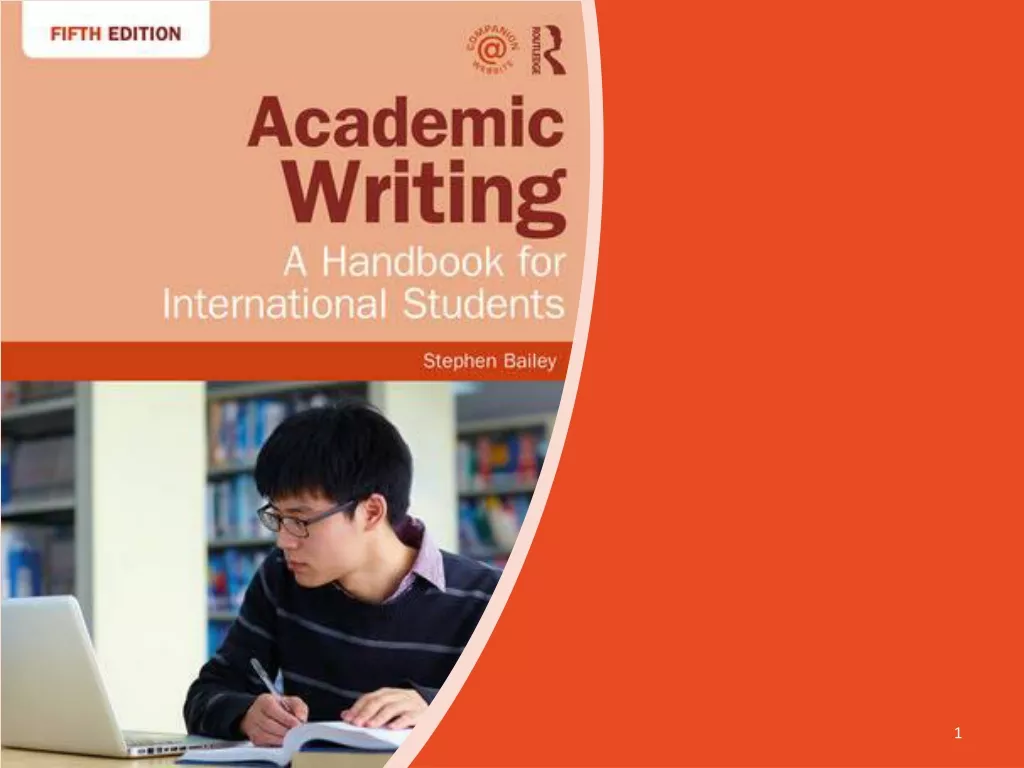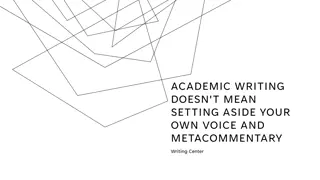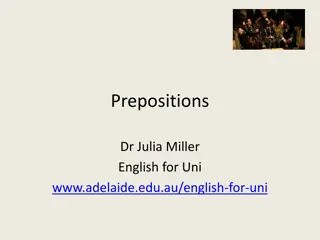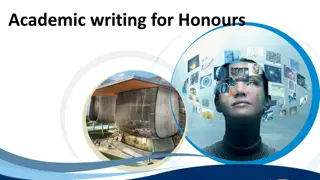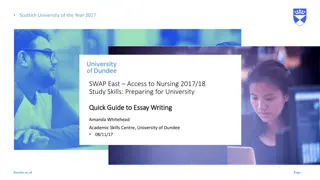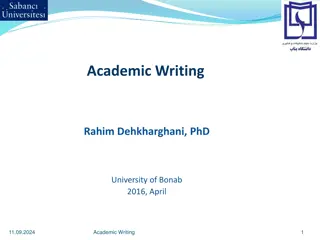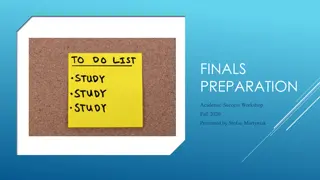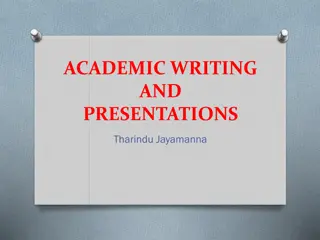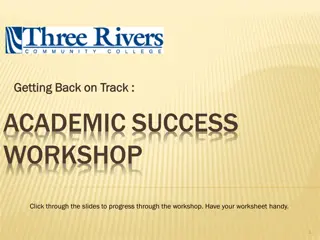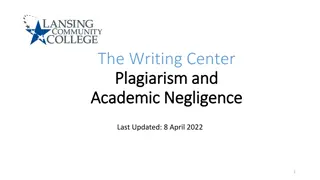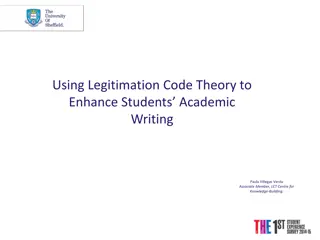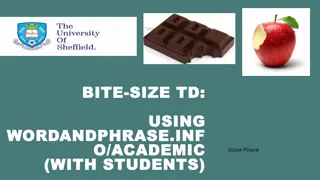Writing Tips for Academic Success
Learn essential writing tips for achieving academic success, including the importance of critical mass, phrases to avoid, power verbs, and word usage guidelines. Enhance your writing skills and master the art of mature academic voice.
Download Presentation

Please find below an Image/Link to download the presentation.
The content on the website is provided AS IS for your information and personal use only. It may not be sold, licensed, or shared on other websites without obtaining consent from the author.If you encounter any issues during the download, it is possible that the publisher has removed the file from their server.
You are allowed to download the files provided on this website for personal or commercial use, subject to the condition that they are used lawfully. All files are the property of their respective owners.
The content on the website is provided AS IS for your information and personal use only. It may not be sold, licensed, or shared on other websites without obtaining consent from the author.
E N D
Presentation Transcript
Common Detractors in Writing You must take notes on this, but you are not required to copy everything word-for-word
Some basics for AP Rhetoric Things to remember and 18 Detractors from Mature Academic Voice
Critical Mass Critical mass refers to the volume of words necessary to adequately articulate your ideas, responses, analysis, and so forth. No matter how well you write, you must produce a critical mass of words for the AP test, in order to achieve a passing score.
Phrases to avoid or delete from your writing The author is trying to say . NO!! The author has already said it. You are trying to comment on the effectiveness of the author s technique. I think, I believe avoid, because, simply put, no one cares. Your task is to analyze the piece before you and identify its techniques and effect on the reader. Whether or not you deem Grapes of Wrath as a great work of literature is irrelevant to your task. Change your perception to that of a college level writer: Using the above referenced phrases is not directly related to your VOICE as a writer.
Remove from your vocabulary Show and flow these are extremely plain, vague words that do little for your writing. Choose, instead, a more interesting and SPECIFIC verb. Reveals, typifies, highlights; cogency, cadence, accentuates, etc. First (I) and second (you) person I will be giving you a list of power verbs and effective tone words in the coming weeks. Refer to it often.
A LOT Please remember that A LOT is two words! Allot is a completely different word. Alot is not a word. It s an eye bump. It is a mythical creature http://hyperboleandahalf.blogspot.com/2010/ 04/alot-is-better-than-you-at-everything.html
Lets be clear AVOID the word or concepts outlined in the following slides:
I Use of first person. Avoid I think, I believe, To me this means
You Use of second person you. Avoid the use of the second person. No: when you die Instead use: When humans die No: The slant rhyme makes you notice Instead use: The slant rhyme makes the reader notice.
Common speech and informal vocabulary Colloquial speech and immature, excessively informal vocabulary. Examples: Your average Joe, Joe College, Back in the olden days, Nowadays, A bunch of a ton of (Does the writer mean a significant number of ?); I would have to say (Not really); That would have to be (Again, not really)
Psychobabble Use of psychobabble: Pap destroyed Huck s self-esteem. The peer pressure on Hester Prynne, Gatsby was depressed by Huck and Jim s life-style on the raft Virginia Woolf, herself a depressed person, writes a rather bi-polar essay.
Absolutes Avoid absolutes: always never everybody I ll bet 99.9% of the people There are exceptions to every stereotype, which is one reason why stereotypes can be so offensive. When you write and speak using absolutes, you come off as a know it all (arrogance) or as someone who is actually less knowledgeable about the topic. Absolutes are a sign of immaturity in writing and speaking. Offset using qualifiers, but not EMPTY adverbs
Extremes, excesses of tone Excesses of tone: hysterical, breathless, indignant, self-righteous, cute, breezy, etc. Example: If a homeless man even talks he gets arrested.
Cheerleading Cheerleading, a special kind of excess of tone when the student lavishes praise on an author or her work. Examples: The greatest poet Does a magnificent job of so awesome, obviously a genius, will affect me for the rest of my life. (Note: this observation is not intended to squelch true passion or heart-felt response to literature.)
Immature, superficial, sophomoric voice (examples) Silly, weak, childish examples: students lack of discernment with regard to quality examples or evidence; using cartoons, Disney movies, etc. as legitimate evidence.
Rhetorical questions Rhetorical questions, especially those with an indignant response, such as: Do we Americans have to put up with this? I think not! RARELY appropriate for rhetorical analysis
Clichs Clich s, all of them. They re as old as the hills.
Exclamation points Exclamation points, especially lots of them!!!!!!
Overuse of Adverbs Most adverbs, such as basically, obviously, surely, certainly, very, really, incredibly, totally, etc. should be used sparingly! For true writers interested in improving their writing in this area, explore to Stephen King s memoir: On Writing.
Meshing the author and speaker into one Writing about the author or the speaker or narrator as though they are the same. Weak: Dickinson greets death as a courtly suitor. Stronger: Dickinson s speaker greets Death as a courtly suitor.
Misspelled names Misspelling the author s name! If you know the author s name, spell it correctly.
Authors by their first names Referring to authors by their first names. Please use Whitman and Dickinson, never Walt and Emily. You are not personal friends with Mark Twain, Ralph Ellison, or Arthur Miller. And even if you were, it s not appropriate for AP Writing.
Authors life vs. His/her work Writing about an author s life rather than his or her work or specific purpose in a text. Weak: Whitman and Dickinson write about death differently due to their different life experiences. Better: Dickinson s purpose in using this image is or Whitman s imagery suggests
Using Technical Vocab Incorrectly Using technical vocabulary incorrectly. Examples: Green uses emotional syntax. She uses dictional phrases like His short fragments are all connected by commas and collaborated into a few run-on sentences.
Gobbledygook, Gibberish Gobbledygook, usually some kind of combination of the characteristics listed above. It imitates pretentious writing but says little. Examples: The author brilliantly uses a hyphen in order to emphasize and reinforce motivation and justice that God provides and installs in each and every man. Meger (sic) imagery provided by the author commences to place a precedence (sic) of their style, a conventional rhetoric that gives the passage somewhat of a quixotic tone.
Other things to remember and avoid Regurgitating the prompt (aka empty openings). Lack of planning. Generalizations instead of analysis. Summary instead of analysis this is big for me and for the scorers. Actually, ANYTHING instead of analysis.
Even more to remember Formulaic writing: aka a writer on autopilot instead of a mind at work, a writer engaged with the text. General carelessness: not differentiating between a poet and a speaker, between a character and a person, between an audience (for a play) and a reader (for text); not spelling words right that are in the prompt, or not getting character names right.
And, a little more Do not over-simplify what is complex; this is a fallacy. Filling the paper with quoted material instead of analysis (commentary). A BIG no- no in analysis writing. Failing to develop ideas.
Taken from: Compiled and adapted by H. Leigh Francisco, SRHS Original compiled source unknown. Current version for compilation taken from V. Stevenson PHHS and http://www.millcreekhighschool.org/users /318MyDocs/18%20Detractors%20from% 20Mature%20Academic%20Voice.doc
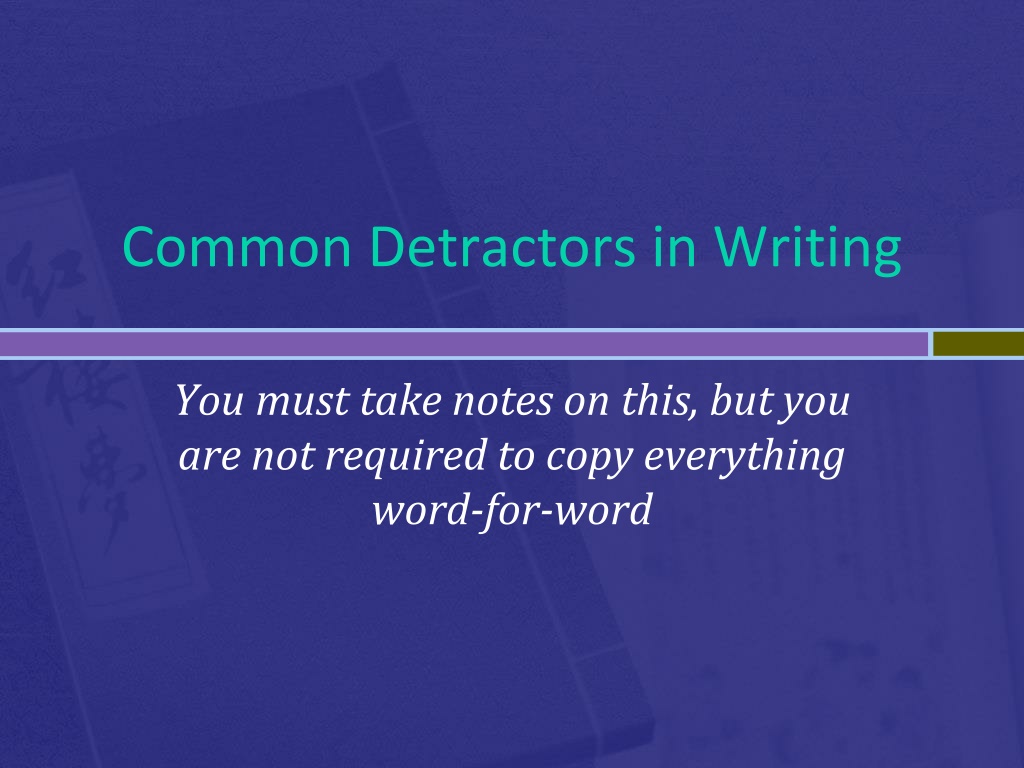
 undefined
undefined
 undefined
undefined
